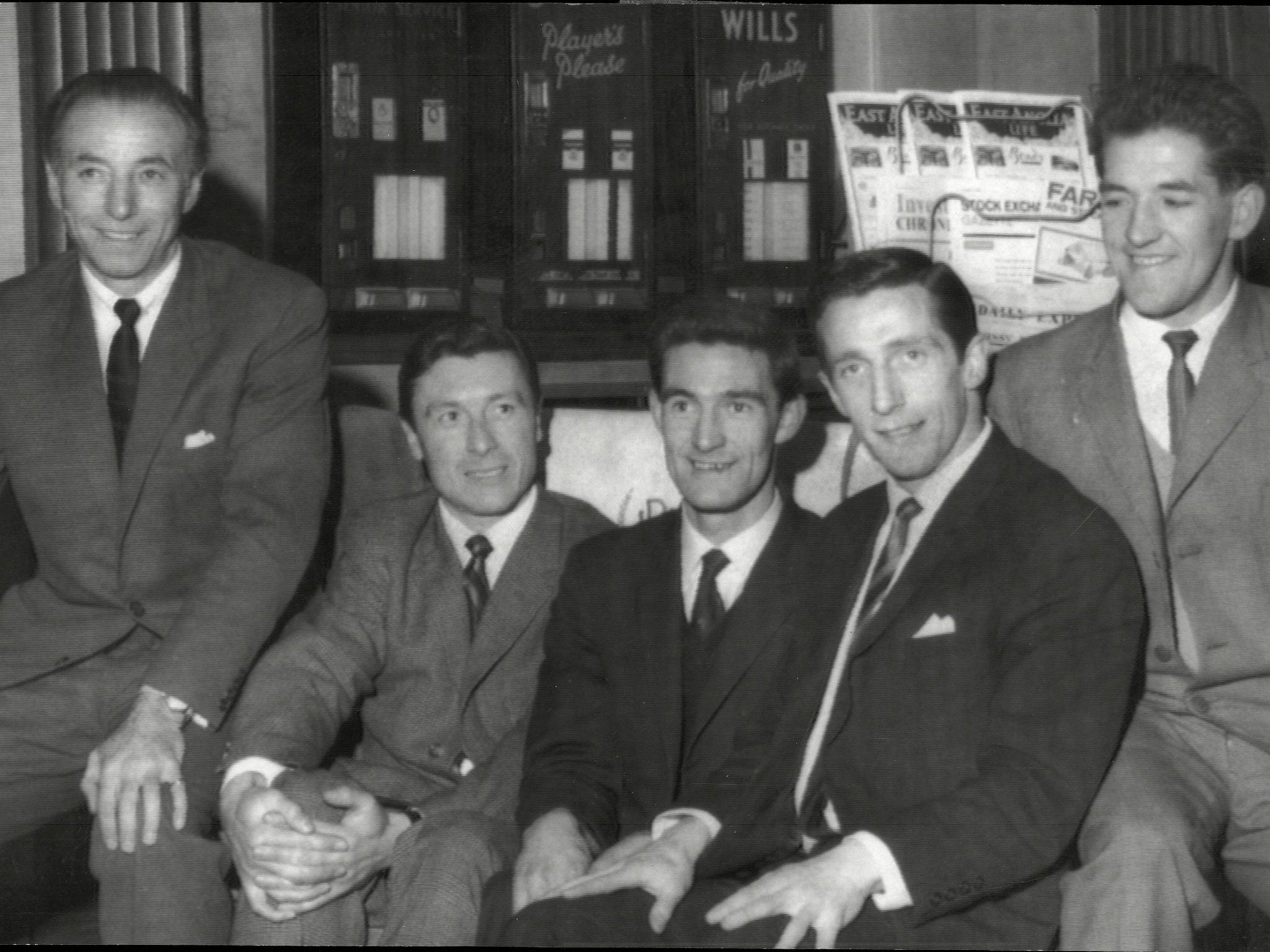Don Ratcliffe: Nippy winger who played with Stanley Matthews during the veteran’s return to the Victoria Ground in the Sixties
'When he set off it looked like he’d run right out of the ground'

For decades, Don Ratcliffe carried a tattered, yellowing newspaper cutting in his wallet. There, in faded print, was a quote by Francisco Gento, then a five-time European Cup winner with Real Madrid, after the Spanish giants had played in the match to celebrate Stoke City’s centenary in 1963.
Gento was asked who had impressed him in the Stoke team, which included Stanley Matthews. The player singled out for lavish praise was indeed a winger – yet it was the left-sided Ratcliffe, following a typically jet-heeled display before 45,000 spectators in a pulsating 2-2 draw.
Less than six months after “Ratter” rattled Real with his pace and directness, he was offloaded to Middlesbrough, having been afforded only eight games by the Stoke manager, Tony Waddington, to prove himself in the First Division after the club’s Matthews-inspired promotion.
But his part in their renaissance, culminating in the triumphant, if snow-ravaged 1962-63 season, was immense. While Matthews drew the plaudits and crowds, Ratcliffe played all 42 games as Stoke won the Second Division title in an attritional struggle with Chelsea and Sunderland.
The pair cut quite a contrast. Matthews – old enough, at 48, to be Ratcliffe’s father – was the master of drawing in a full-back before a sudden dart to the byeline and a cross of surgical precision. More often than not, Ratcliffe would push the ball ahead of his opponent and try to out-sprint him; over 20 yards, few defenders could stay with him.
Stoke’s record appearance-maker Eric Skeels, another unsung hero in a team bristling with veteran artists such as Jimmy McIlroy, Dennis Viollet and Jackie Mudie, told me recently that Ratcliffe’s colleagues had trouble keeping up with him. “When he set off it looked like he’d run right out of the ground,” he said. “We used to shout: ‘Open the gates, Ratter’s coming!’”
Born locally, Ratcliffe had joined Stoke as a teenage amateur in 1950 after a recommendation from a grocer, who had noticed him playing in the street. He turned professional three years later, although he was not, initially, seen as a wide player, instead operating in a variety of roles, including wing-half and inside-forward.
His debut came on Christmas Day 1954, against Bury at the old Victoria Ground. Bizarrely, six of his first 11 appearances were against the Lancashire club, whom Stoke met twice over the festive season before embarking on an extraordinary series of FA Cup tussles with them – in which he scored his first senior goals – which was finally settled in the Potters’ favour at the fifth time of asking.
By 1961, Ratcliffe was a regular in a Stoke side who were drifting aimlessly in the lower Second Division. Apathy was widespread. Barely 4,000 turned up to watch them against Liverpool, and the average home attendance was 8,400.
In September, Waddington gambled on bringing Matthews back to his first club from Blackpool. Ratcliffe wore the No 7 shirt on the first Saturday the 46-year-old was available, when Stoke lost at Plymouth. The “new” signing was held back for the home match against Huddersfield. Nearly 36,000 saw Stoke win 3-0, with Ratcliffe, at No 11, rampant on the left.
He later told the story about asking “Waddo” for a pay rise shortly before Matthews’ return was mooted. The manager assumed he was on safe ground offering Ratcliffe £1 for every 1,000 spectators over the 10,000 mark. After Matthews’ homecoming, with crowds soaring to between 20,000 to 30,000, The beneficiary enjoyed telling friends he was “quids in”.
He held his place as the team began to be upgraded by “name” players attracted by the Matthews effect. However, creating Viollet’s vital winner against Sunderland on Easter Monday 1963 would be one of his last significant acts in the red-and-white stripes. In September he was sold to Second Division Middlesbrough for £27,500.
Boro had a core of quality, including England players Alan Peacock and Mick McNeil and the young Cyril Knowles, but could not perform consistently. Ratcliffe never recaptured on Teesside the form of his final full season in the Potteries. Versatility had long been a feature of his game – Waddington joked that he could have been the first £100,000 player; £10,000 for every position he could play – and he even had a run at right-back. Tempestuousness was another such feature, though, and he later branded Boro’s manager Raich Carter “a waste of space”.
Further transfers, to Darlington in 1966 and Crewe Alexandra two years later, delivered two more promotions, both from the Fourth Division, before he retired in 1969 with 436 league games and 33 goals behind him. When Stoke marked their 150th anniversary last year, some ex-players were startled to see Ratcliffe in a wheelchair. Nevertheless, the crowd’s ovation underlined their appreciation of the flier who provided such a foil for Matthews’ wizardry.
Donald Ratcliffe, footballer: born Newcastle-under-Lyme, Staffordshire 13 November 1934; married Barbara (one son, one daughter); died Crewe, Cheshire 19 October 2014.
Join our commenting forum
Join thought-provoking conversations, follow other Independent readers and see their replies
Comments